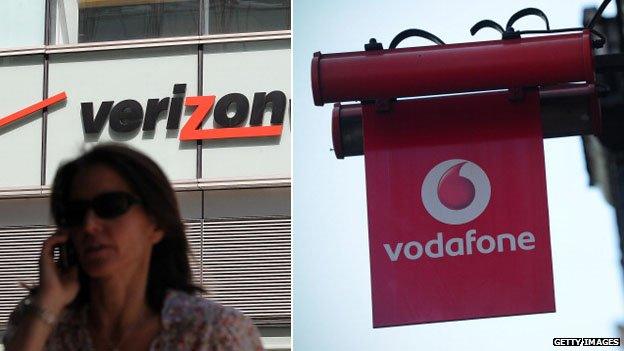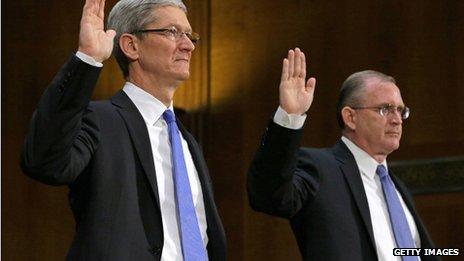Tax dilemma for Vodafone over Verizon Wireless sale
- Published

How much tax could Vodafone pay if it sells its stake in Verizon Wireless, valued at more than $100bn?
Stock-markets are already getting excited at the prospect of a deal that would rank among the largest transactions in corporate history.
On one side is Vodafone, which already claims the title for the biggest hostile takeover in history, of the German telecommunications firm Mannesmann in 2000, for £110bn. But this time, it is the seller, not the buyer.
It owns 45% of Verizon Wireless, a highly profitable US mobile network. The rest belongs to Verizon Communications, which has often said it would like to own the whole company.
Anticipation has been rife in recent months that the deal is finally about to go through, and the share prices of both companies have leapt in anticipation. Verizon has named a price of $100bn (£65bn), but analysts suggest the actual figure would be higher.
Tim Daniels, analyst at the Olive Tree Financial Group, says the figure would be in the range of $121bn to $137bn.
"Verizon Wireless is probably the most exciting mobile asset on the planet at the moment," he says.
"It dominates the US domestic market, and as people switch to consuming more data over mobile devices, whether it be tablets or phones, the business is continuing to grow, and generating an awful lot of cash in the process."
Fair share?
With such a vast windfall coming to a UK corporation, the chancellor might expect to receive a share. But it is by no means certain that the deal will generate any tax income for the UK or any other government.
In a conference call with investors in April, the chief financial officer of Verizon Communications, Fran Shammo, said: "We are extremely confident that such a transaction could be accomplished in a manner that is very tax-efficient and would not result in a tax on the gain in that stake."
The US tax expert Robert Willens agrees that the deal can be done almost tax free. "There shouldn't be any US tax, nor should there be any UK tax because of the substantial shareholding exemption," he says.
This rule means companies do not pay capital gains tax on the sale of overseas subsidiaries, if the stake is over 10% and held for more than 12 months.
In his analysis, the only possible tax on the deal comes from the fact that the holding company that owns Vodafone's share of Verizon Wireless also owns stakes in other Vodafone businesses in Europe and around the world. Verizon Communications is unlikely to want these foreign assets, but may incur a tax bill when it gets rid of them.
Analysts at New Street Research have estimated this tax bill at anywhere up to £3bn, payable to the US Internal Revenue Service, with the UK government receiving nothing.
However Vodafone's stake in Verizon Wireless is owned via a network of holding companies in the US, the UK, the Netherlands, and the low-tax jurisdictions of Jersey and Luxembourg. This complex corporate structure makes it very difficult to analyse.
Vodafone could be about to do one of the biggest deals ever in the United States.
It is also impossible to know for sure how much tax would be due until the deal is confirmed, if indeed it ever takes place.
Image risk
But if Vodafone does pay a very low bill on the deal, the company risks a hostile reaction given the high profile political debate around corporate taxation, says Professor John Kay at the London School of Economics.
"The norm in the past has been that you would structure deals like this so that there is little or no corporation tax [or] capital gains tax liability," he says.
"But in the current climate it will be strikingly controversial if they do that. This will put them in the front line of the debate about corporation tax avoidance around the world."
The issue of corporation tax has been at the top of the political agenda in recent months. Apple chief executive officer Tim Cook recently had to defend his company's tax policies in front of a congressional committee, while Google, Amazon and Starbucks have also been criticised for paying too little corporation tax in the UK - accusations they dispute.

Apple executives were criticised by a US committee on its tax affairs
Vodafone said in a statement that any discussion of the tax treatment of a potential Verizon Wireless deal was at best speculative as the deal has not yet happened.
It said: "There are many potential outcomes, should a bid materialise, and this is reflected in the numerous potential tax outcomes in analyst notes on the subject. It would be erroneous to assume, in the absence of a bid, how one could determine a potential tax position when the matter is complex and multi-jurisdictional."
Vodafone also says it pays the taxes due in every country in which it operates.
If the deal does go through, the British economy would certainly feel the effects of an injection of capital on such a scale. If the sale goes ahead, Vodafone is expected to return a significant proportion of the gains on its stake to its shareholders - which could be in excess of $50bn.
Paul Kavanagh, of stockbrokers Killik and Co, says: "Certainly we would expect the Vodafone share price to respond very positively, but of course that cash will find its way back onto the stock-market and certainly should provide quite a healthy boost to share prices that are already on quite an upward trend."
The question remains whether national governments on either side of the Atlantic would receive a financial boost as well.
- Published3 June 2013
- Published23 May 2013
- Published21 May 2013
- Published2 April 2013